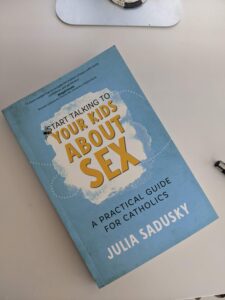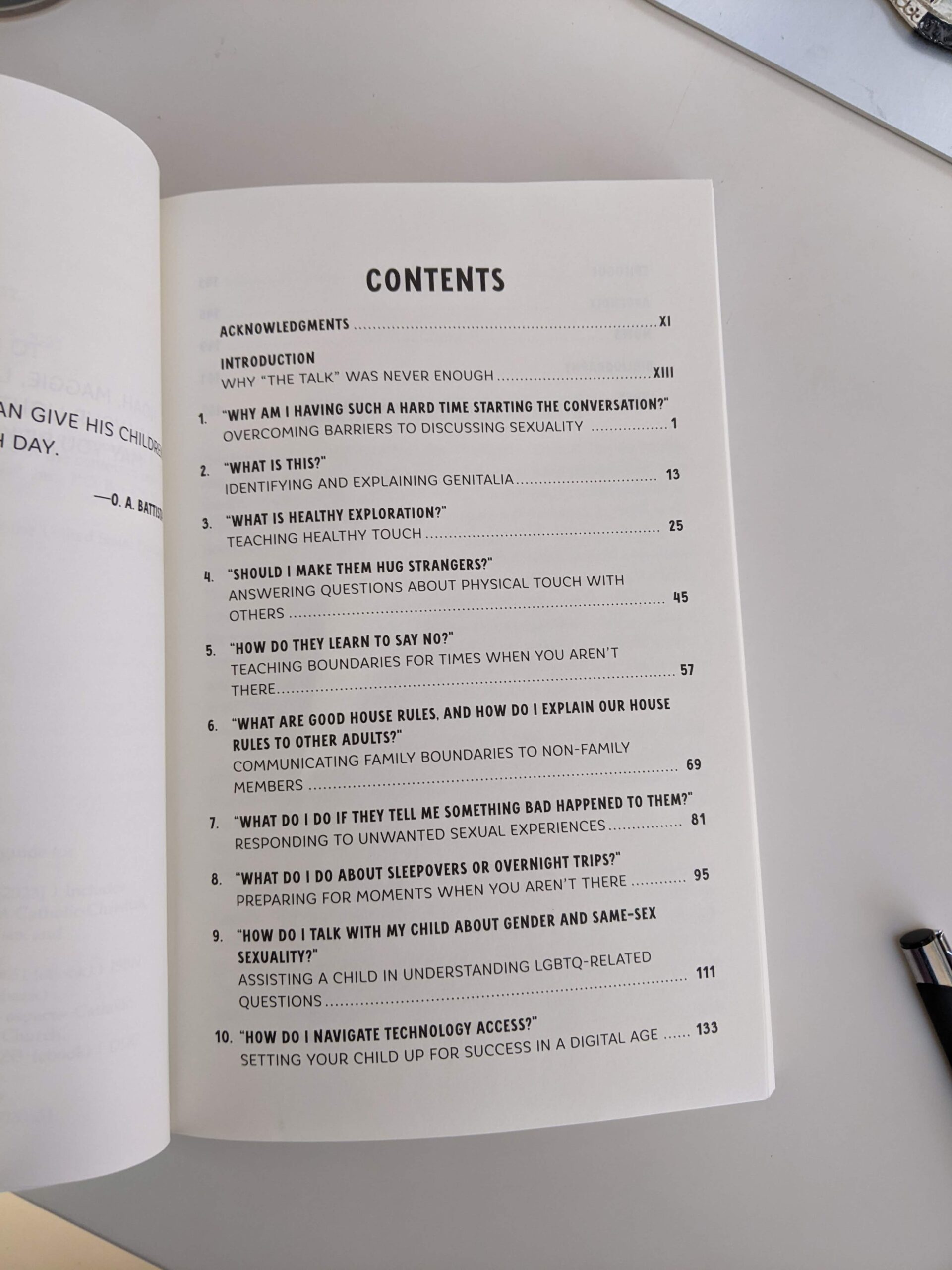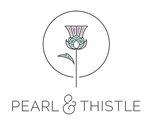
Birth Control: Why is it Bad?
September 13, 2023
Family Planning Blood Draws
December 7, 2023Sex Ed: Book for Catholic Parents
This week I'm going to jump right in because I want to share a BRAND NEW book with you all that I think is going to spark some interesting conversations. It's a book called Start Talking to Your Kids About Sex: A Practical Guide for Catholics.
This book is the FIRST of a pair of books on the same topic, focusing on conversations prior to puberty. Her second book (to be published) will cover puberty and adolescence.

Dr. Julia Sadusky is a licensed clinical psychologist with all the "right" credentials to make a parent feel comfortable that she's not going to lead you totally astray here. She graduated from Ave Maria University, has ample endorsements from clergy, and the book has a Nihil Obstat & Imprimatur. All of that should be taken into account along with the fact that she specializes in working with clients who have experience sexual-related trauma, including the Catholics who identify as LGBTQ.
To that end, I think she does an incredible job of modeling a thoughtful, respectful Catholic posture towards conversing with individuals on these very sensitive (and often heated!) topics. There is a lot we can learn simply by observing her attention to the reader and the care with which she phrases ideas: not compromising anything of the Catholic faith, but also not being dismissive towards those we don't agree with or find it difficult to understand.
But have you noticed that nothing I've mentioned so far has to do with having a "birds & bees" talk with your kids?
That's where I feel like this book sort of let me down-- because while she does have some sections about terminology and approaches to these conversations, I really feel like the entire purpose of this book is: "Creating a family culture that equips children to be less vulnerable to sexual abuse."
When I reached the epilogue, my feelings were confirmed as I read:
"If even one child is safeguarded from abuse because of your reading this book, it will be worth it."
The fact that this is the purpose of the book raises a lot of interesting thoughts for me, so I give two of those things to you here:
- As I was reading the book, it was obvious that she was teaching strategies for parental conversation that felt.... well, clinical. I don't disagree with any of her suggestions, but over and over and over again I felt myself doing the mental work of saying, "Okay fine. That's how a therapist would talk to my kid. But that's not how I talk to my kid. Could I rephrase things in a way that feels more natural to the relationship I have with each of my individual children???" Maybe that's exactly what she wants to prompt in parents! But it's still a lot of work.
- I began wondering why I was surprised by the emphasis on strategies for preventing sexual abuse. For some reason, that felt like a separate topic from teaching my children the mechanics of "sex." But why would I assume that conversations "About Sex" are primarily about mechanics? Obviously this isn't the case, especially for smaller children. And here's where my thought gets muddy: as a parent, I have lots of conversations with my kids about not keeping secrets, consent, autonomy, the dignity of our bodies... etc. etc. But in my mind, those conversations are not ABOUT sex or preventing sexual trauma. Some of the desired results of those conversations relate to decreasing vulnerability and making sure there are no barriers to confiding in their parents if something does happen.... but teaching my kids that they need to stop tickling each other the second that someone says, "No" or "Stop" is also about bullying, setting and respecting boundaries about ANY type of peer activity, and overall safety. For example: my diabetic five-year-old shouldn't have to articulate "Stop pulling my arm because I can feel my insulin pod ripping off" in order to get a response. She should know that she can just say "Stop" and then supply an explanation later if she wants to.
So I actually have really conflicting thoughts on this book, but NONE of them would lead me to NOT recommend it, if that makes any crazy sense.
I think Dr. Sadusky has written a fabulous primer on helping parents navigate the tricky balances of working through our own issues and hangups about sex without transferring them to our children, talking with other adults who may not understand the boundaries we set in our own families, and jumping into some really tricky conversations about sexuality and gender with our kids that we NEVER had to have with our own parents because... well, that's just not where the world was at when we were growing up.
It's not the book I was expecting, although there are a few sections that are helpful in those "birds & bees" talks-- but I think it's a book that modern Catholic parents need, and can learn a lot from.
In case you're curious, here's the table of contents:

❤️ Loved this post? Be sure to subscribe to the Body Lit Library weekly newsletter, where every Thursday you'll get access to new content, updates, and special insider offers!
📚 Want to learn more? Check out our lifelong body literacy education courses and books, from puberty through perimenopause and everything in between: pearlandthistle.com


